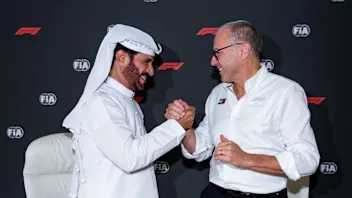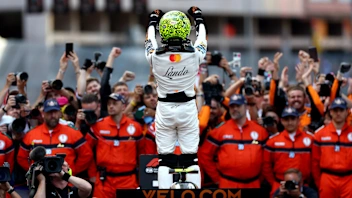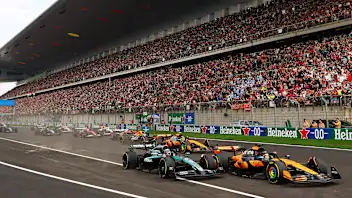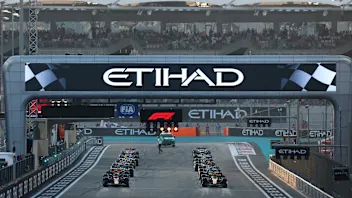After several near misses in recent years, Ferrari came into 2014 determined to profit from the new regulations by returning to the front of the field. But while the F14 T has proven both competitive and reliable, neither Fernando Alonso nor Kimi Raikkonen has scored a podium in the opening two races. In an exclusive interview, team principal Stefano Domenicali reviews the team’s start to the season…
Q: Stefano, you’ve said you won’t play the blame game, but somewhere it did go a bit wrong. Will 2014 be another difficult season?
Stefano Domenicali: We knew from the very beginning that with these rules changes the challenge will be massive. When we went about designing the 2014 car we knew it would not only be a matter of the engine - where we believe we are quite strong - but also a matter of considering the whole power unit. We know that other engine manufacturers have advanced knowledge because they use that technology in their road cars, so we knew it was not going to be easy. But we know the areas where we need to improve and falling into disappointment doesn’t help. I know that we have improved our organisation in some areas where we have been weak…
Q: …like what?
SD: Aerodynamics above all. We saw clearly in the past with the blown exhaust that we were not able to exploit the maximum from it, so I am confident that we have taken the right route. It is a matter of time, but I would say that we have to be careful of drawing conclusions now. For sure Mercedes has been the best in terms of performance, and that is our target now. Don’t forget we are only at the second race of the season, so judgment has to be taken very carefully. Just think back: after the first test people believed that Red Bull were finished. We have to be calm.
Q: You said that you have identified the areas that are weak on this year’s car: can you pinpoint them?
SD: Basically everywhere. I don’t think by fixing one problem you fix the whole performance - so we need to work to have a more efficient car; we need to work to have a better engine; we need to work to exploit better the balance between electric power and traditional engine power. Everywhere!
Q: So you need a new car?
SD: No, no, that’s a bit extreme. I don’t think so.
Q: Can you estimate how much it cost Ferrari to build the new powertrain?
SD: A lot of money We had to invest in new technologies that we didn’t have at all, so it has been an incredible investment. I am pretty confident it will be useful in the future for our colleagues on the GT side because certain technologies will become part of the GT world. I don’t know when for our brand, but it is an advanced technology like it was in the past with the traction control or the automatic gearshift. Nobody in the beginning thought that it would be possible to transfer this to the other side of the company, but it happened.
Q: When looking at the other two engine manufacturers, Mercedes and Renault, they have huge car companies behind them. Compared to them Ferrari is a boutique. Hasn’t that fact made it more difficult for Ferrari?
SD: Sure it was more difficult for us - and we knew that. But that is the beauty of the challenge. We have to fight so that we can keep up.
Q: So what about giving Ferrari an advantage of 10 metres on the grid for the disadvantage of the development facilities?
SD: Ha, funny idea, but we love the challenge - it has always been part of Ferrari’s nature and heritage.
Q: Much has been said about the sound of these turbo engines, and the change in that unmistakeable F1 sound. Ferrari had its own sound; you could tell a Ferrari from all the other cars by the noise alone. With that gone, some might say a part of the Ferrari DNA is gone. Does that make you happy?
SD: For sure this year is different, no doubt about that. But we need to be careful in judging that. The world is changing so quickly, as is the attention to the value of the sound. We probably still believe that strong vibrations are important, the next generation probably believes the opposite, so we have to be prudent. Those who remember the past times of the turbo with no limitation on fuel flow, it was even less noisy. But back then V12s raced together with turbos, so it was a mixture of sounds.
Q: How relevant is the new F1 engine development for the Ferrari road car division? Take away the sound, and why bother buying a Ferrari?
SD: For sure the engine noise - or call it engine music - is part of the adrenalin that you get when you buy such a car. But also look back: some years ago you would never have imagined having KERS on a Ferrari, and now with LaFerrari you have KERS developed with our F1 department. That is the nature of changes and developments.
Q: Surely no sport is truly ‘relevant’, except in that it entertains the masses. Why the cry for ‘relevance’ in motorsport?
SD: For us it is relevant, because we are a constructor. For other teams that are not constructors the current development is probably absolutely unimportant.
Q: You are the only team with two champions behind the wheel. How do you see the performance of your two stars?
SD: My only worry - or let’s use the word ‘focus’ as ‘worry’ has a bit of a negative meaning in English - is to make sure that we give them the best car we can. That is the urgent need, and it has to happen very soon. So far Fernando has proved to be fast immediately. Kimi needs some time to understand the car, but you can see he is getting there. I am sure from the drivers’ side there will not be a problem.
Q: Were the Melbourne and Kuala Lumpur performances what you had expected after the tests?
SD: After the tests it was clear that Mercedes was ahead. Many others seemed to be quite close, so it is no surprise to see the classifications that we have seen in Australia and no Malaysia. If Mercedes keeps the pace it will be very difficult to match them.
Q: Were there any changes between Australia and Malaysia?
SD: Only bits and pieces. Nothing so relevant - basically work on tuning and trying to understand the logic of the new car, because there is still a long way on our side to improve.
Q: Will the attack come in Barcelona?
SD: No, it is not a question of attack or no attack. We need to make sure that we further develop the car - because if I say now that in Barcelona things will dramatically turn around then you will probably come back to me saying ‘you said so’. Facts, not words!
Q: Your exit from the Ferrari team principal position has been predicted many times. How many more difficult seasons can you survive?
SD: I don’t care what people say, because there are so many people wanting my job. It is a privilege to be in this position, but once it is over, don’t worry, I will be around - not here, but in another place. That is not a personal problem. Say to all those jealous people wanting this job: they have to fight for it!
Q: Lest it goes unnoticed, you had a very nice conversation with Sebastian Vettel just before the Malaysian race. Could he be on your radar?
SD: Sebastian is a fantastic driver, a four-time champion. That’s a fact. We as Ferrari are very pleased with what we have, and I am sure that Sebastian is also pleased with his situation because it looks as if he can fight again.
Next Up
Related Articles
 3 inspiring individuals share their paths to working in F1
3 inspiring individuals share their paths to working in F1 F1, the FIA and 11 teams sign 2026 Concorde Agreement
F1, the FIA and 11 teams sign 2026 Concorde Agreement PalmerThe 6 defining moments of Norris’ title-winning season
PalmerThe 6 defining moments of Norris’ title-winning season Sainz hopes point-less finish in Abu Dhabi ‘serves as a wake-up call’
Sainz hopes point-less finish in Abu Dhabi ‘serves as a wake-up call’ Tickets on sale for 2026 Chinese Grand Prix
Tickets on sale for 2026 Chinese Grand Prix This Week in F110 quiz questions on the Abu Dhabi title decider
This Week in F110 quiz questions on the Abu Dhabi title decider